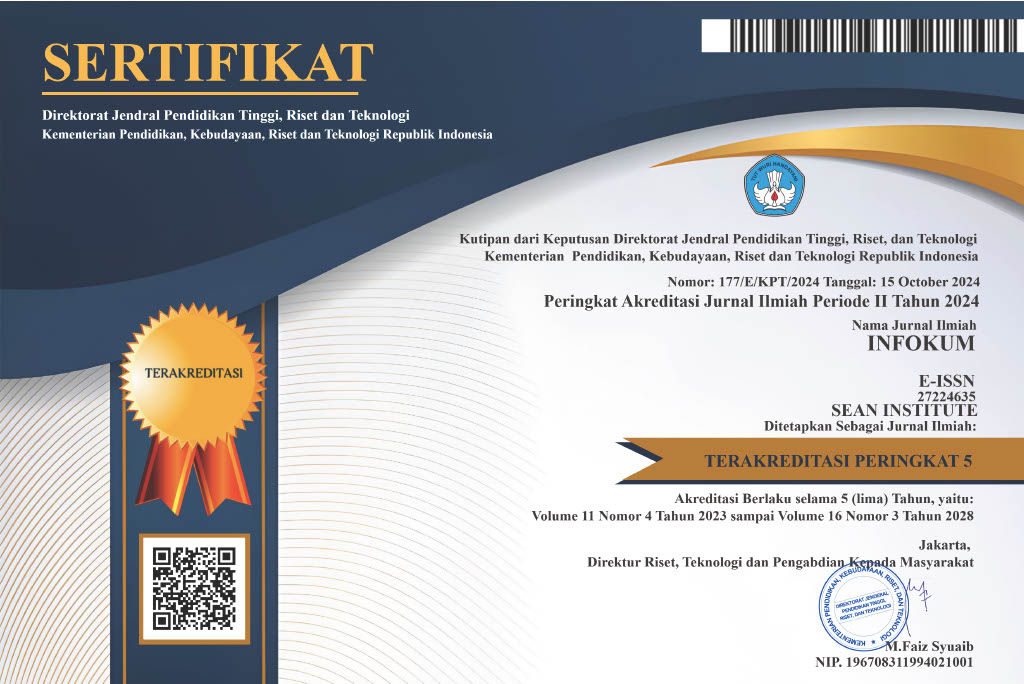Collaborative Governance in the Implementation of the 2024 Ministry of Youth and Sports Youth Service Program (Study in Lebak Regency, Banten Province)
Abstract
This study aims to analyze the implementation of Collaborative Governance in the implementation of the 2024 Bakti Pemuda Nusantara Program (BAPEN) organized by the Ministry of Youth and Sports (Kemenpora) in Lebak Regency, Banten Province. This program is a national initiative involving cross-sector actors, including the central government, local governments, youth organizations, and local communities, in encouraging youth empowerment and development of the 3T (underdeveloped, outermost, and frontier) regions. This study uses a qualitative approach with a case study method, and examines the four main dimensions of Collaborative Governance, namely Starting Condition, Institutional Design, Facilitative Leadership, and Collaborative Process. The results of the study indicate that the implementation of the program has reflected quite effective collaborative practices. The local government showed high structural readiness and flexibility in responding to the program, while local youth organizations appeared enthusiastic and played an active role in assisting participants. Institutionally, the program is supported by formal regulations from the center and regions, as well as strong operational coordination through the establishment of a Joint Secretariat at the activity location. Facilitative and solution-oriented leadership also contributed to smooth implementation, especially in the face of time and resource constraints. However, there were weaknesses in aspects of hasty initial planning, the absence of a permanent collaborative forum, and a weak support system for program alumni in their home regions. The conclusion of this study emphasizes that the Collaborative Governance approach has great potential to strengthen the effectiveness of youth programs in the regions, but requires improvements in terms of initial planning, sustainable institutions, and cross-sector policy integration so that program results can be more optimal and sustainable.
Downloads
References
Ahmad, Subagyo. 2003. Marketing In Business. Jakarta : Mitra Wacana Media.
Arikunto, Suharsimi. 2011. Prosedur Penelitian: Suatu Pendekatan Praktik. Edisi Revisi VII. Jakarta: PT. Rineka Cipta.
Agranoff R. and Mcguire, M. (2003). Collaborative Public Management: New Strategies For Local Governments. Washington, D.C.: Georgetown.
Agranoff, R. (2019). Inside Collaborative Networks : Ten Lessons for Public Managers. Public Administration Review, 66, 56–65. University Press.
Budiarjo, Miriam. 2003. Dasar-Dasar Ilmu Politik. Jakarta: Gramedia Pustaka Utama.
Blomgren Bingham. (2010). Building The Legal Infrastructure For Collaborative Governancee.
Labolo, Muhadam. 2006. Memahami Ilmu Pemerintahan. PT RajaGrafindo Persada: Jakarta.
Labolo, Muhadam. 2007. Memahami Ilmu Pemerintahan. PT RajaGrafindo Persada: Jakarta.
Mulyana, Deddy. (2018). Ilmu Komunikasi Suatu Pengantar. Bandung : PT. Remaja Rosdakarya.
Moh. Pabundu Tika. (2015). Metode Penelitian Geografi. Jakarta: PT. Bumi. Aksara. Nasution.
Mukhlis Muchad F (2007), Pengembangan Pemuda yang Insani, Bandung: Pustaka. Setia.
Moleong, L. J. 2010. Metodologi Penelitian Kualitatif. Bandung: PT Remaja Rosdakarya.
Miles, M.B, Huberman, A.M, & Saldana, J. (2014). Qualitative Data Analysis, A. Methods Sourcebook, Edition 3. USA: Sage Publications.
Ndraha, Taliziduhu, 2003, Teori Budaya Organisasi, Cetakan Kedua, Jakarta: PT. Rineka Cipta.
Ndraha, Taliziduhu, 2015, “Pembangunan Desa dan Administrasi Pemerintahan Desa”, Yayasan Karya Dharma, Jakarta,
Ndraha, Taliziduhu. 2011. Kybernology: Ilmu Pemerintahan Baru. Jakarta: Rineka Cipta.
Robertson, Perter J. dan Taehyon Choi. 2010. Ecological Collaborative Governance: Organizing Principles for an Emerging Era. American Sociaty for Public Administration
Sugiyono. (2007). Metode Penelitian Kuantitatif, Kualitatif, dan R&D. Alfabeta.
Syafiie, Inu Kencana. (2019). Definisi Pengawasan dan Teori Pengawasan, Bandung: Rafika Aditama.
Taufik Abdullah (2017), Pemuda dan Perubanhan Sosial, Jakarta: PT Pustaka LP3ES Indonesia.
Bianchi, Nasib, dan Rivenbark (2021), Penelitian dengan judul Implementing Collaborative Governance: Models, Experiences, and Challenges
Bodin, (2022), Penelitian Collaborative Environmental Governance: Achieving Collective Action in Social-Ecological Systems.
Mukhlis dan Ryzal, (2023), Penelitian A Critical Analysis of the Challenges of Collaborative Governance in Climate Change Adaptation Policies in Bandar Lampung.
Parikesit, Heru, Vernanda (2023), Penelitian Collaborative Governance Dalam Perencanaan Program Pengentasan Tengkes.
Sri Wahananing Dyah (2020), Collaborative Governance Dalam Upaya Penanggulangan Pasca Gempa di Wilayah Jawa Bagian Barat
Saptono Jenar (2023), Penelitian Legal Policy on Regulating The Acceleration of Development in Disadvantaged Regions.
Triyanto, Warsono, dan Herwati (2023), Penelitian A Study Collaborative Governance in Bengkulu City, Indonesia.
Tando, Sudarmo, dan Haryanti, (2023), Penelitian Collaborative Governance in New Era for Problem Solving: A Literature Review.
Yunifar, Kusbandrijo, dan Puspaningtyas (2023), Penelitian Collaborative Governance Pada Penerapan Perwali No 79 Tahun 2022 Tentang Percepatan Penurunan Stunting di Kota Surabaya.
Wijaya, Sa'ban, dan Nastia, (2023), Penelitian Opportunities and Challenges of Collaborative Governance in Local Government Tourism Public Policy
Kemenpora 2024. Laporan Program Bakti Pemuda Nusantara Kemenpora Tahun 2024.
LAKIP 2024. Laporan Akuntabilitas Kinerja Instansi Pemerintah (LAKIP) Kemenpora
Undang-Undang Tahun 2009. Undang-Undang Nomor 40 Tahun 2009 tentang Kepemudaan. Lembaran Negara Republik Indonesia Tahun 2009 Nomor 148. Jakarta: Sekretariat Negara.
Laporan Statistik Pemuda Indonesia Badan Statistik Nasional (BPS) Tahun 2023
Undang-Undnag Tahun 2009. Undang-Undang Nomor 40 Tahun 2009 tentang Kepemudaan.
Peraturan Presiden Nomor 106 Tahun 2020. Tentang Kementerian Pemuda dan Olahraga
Peraturan Presiden Nomor 43 Tahun 2022. Tentang Koordinasi Strategis Lintas Sektor Pelayanan Kepemudaan;
Peraturan Presiden Nomor 18 Tahun 2020. Tentang Rencana Pembangunan Jangka Menengah Nasional Tahun 2020-2024.
Peraturan Menteri Pemuda dan Olahraga Nomor 8 Tahun 2022. Tentang Organisasi dan Tatakerja Kementerian Pemuda dan Olahraga.
Rencana Pembangunan Jangka Menengah Nasional 2020–2024. (RPJM) Rencana Pembangunan Nasional










